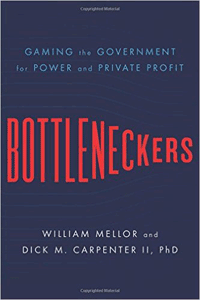The Institute for Justice has created a new word with the title of a new book. “Bottleneckers: Gaming the Government for Power and Private Profit” describes how special interest groups lobby government to limit competition. We learn about average businesses that we buy from who are squeezed out of their industry by unrealistic government mandates. The authors know their stuff and tell how rules and policies made by political hacks and enforced by administrators at many different layers of government can undermine “…the American birthright of economic liberty – the right to earn an honest living free from onerous and unnecessary government intrusion.”
 Restrictive licensing, exorbitant fees, unrealistic schooling requirements and irrelevant testing are some of the methods used to stifle entrepreneurship, limit customer choices and increase prices for those who successfully lobby to keep competitors away. William Mellor and Dick Carpenter’s sharp legal minds present detailed and rather disturbing stories of casket makers, hair braiders, tour guides, different types of food carts and mobile vendors – plus many others – battling to conduct their business.
Restrictive licensing, exorbitant fees, unrealistic schooling requirements and irrelevant testing are some of the methods used to stifle entrepreneurship, limit customer choices and increase prices for those who successfully lobby to keep competitors away. William Mellor and Dick Carpenter’s sharp legal minds present detailed and rather disturbing stories of casket makers, hair braiders, tour guides, different types of food carts and mobile vendors – plus many others – battling to conduct their business.
We learn about caskets that are marked up 500 to 600 percent and a minister who tries to intervene on behalf of his parishioners to get more affordable caskets in Tennessee. We learn about monks who manufacture caskets and get into a bottleneck with the State of Louisiana. We learn that these states require casket sellers to be licensed funeral directors, which requires 16 month of school at a cost of $12,000, a one-year apprenticeship program, and to assist with 25 funerals. Neither the minister nor the monks had the time or interest to be funeral directors and only wanted to sell good and significantly cheaper caskets to bereaved families. The Funeral Directors Association maintained that their standard was to be upheld. In both cases, lawsuits followed and lasted for years. Similar cases were reported in other states.
Food carts are discussed in detail with Chicago being very restrictive. In El Paso, Texas, food cart restrictions were loosened and business flourished, adding interest and walk-up traffic wherever carts were located. According to the authors, research showed that food carts add ethnic food varieties and tend not to attract the same customers that typically go to restaurants. However, restaurant associations often fight food carts and lobby against them. In many cases, public officials respond with restrictive licensing, zoning, high fees and fines for non-conformance.
This book is packed with real-life examples of frustrated entrepreneurs who are “bottlenecked” to conform to unrealistic local or state demands to conduct their business venture. Some of the requirements are outrageous and ridiculous. Although the authors show how associations related to cosmetology, funeral directors and interior design lobby local and state offices, it lacks proactive solutions.
Small business entrepreneurs need to understand the decision-making process of policy makers and the operational side of enforcers of unfair licensing and barriers. The book misses the “teaching moment” of how entrepreneurs can anticipate and counter unfair rulings; ignorance plays a major role in policy making. Elected officials and government administrators rarely understand the complexities that small entrepreneurs face to maneuver through all that is required to conduct business.
Small operators rarely have the time and resources to explain and counter unfriendly and protectionist rulings that impact their ability to conduct business. I recommend the authors write a sequel to this book that gives entrepreneurs the tools to proactively educate policy makers on the impact of the laws they create.
“Bottleneckers” is an excellent start to understanding the power of political manipulations – under the guise of safety – that keep competitors away. I recommend it to business people, but most importantly, I recommend it to elected officials and policy makers. We all pay the price of unfair legislation in higher prices and reduced choices for consumers. Our business ecosystem atrophies when licensure and unfair policies keep good people away from participating in our business arena. Protectionism and the barriers to our entrepreneurial talents harm communities and the book explains why.
Lucia Worthington is an advocate for good business practices for the entrepreneur and policy makers that determine the rules of the game. She is a professor of business and management at Clark College. To recommend a book for review, email bookreviews@vbjusa.com.

